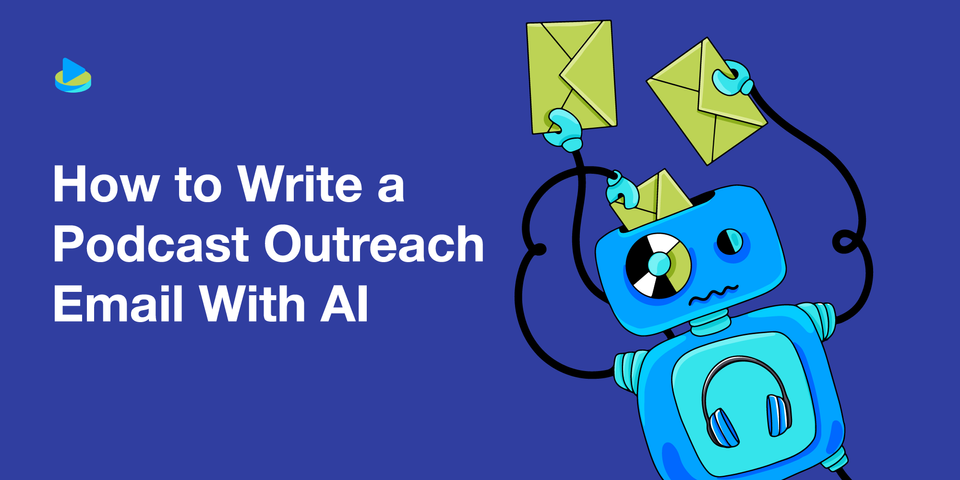The easiest way to write a personalised podcast guest email that gets you booked is using this ChatGPT tool we created at Rephonic.
We built this custom GPT after hours of testing the major platforms like ChatGPT and Claude. It's based on the following guest pitching process we developed and is designed to spark replies and get interviews booked (instead of getting you ghosted.)
Key Takeaways
- Focus on pitching unique talking points that are specific to that podcast and add value to listeners.
- Feed a guest bio and previous episode titles to ChatGPT for talking point suggestions.
- Get AI to produce a first draft based on our pitch template.
- Avoid common mistakes like sending an AI-written pitch without adding your personality.
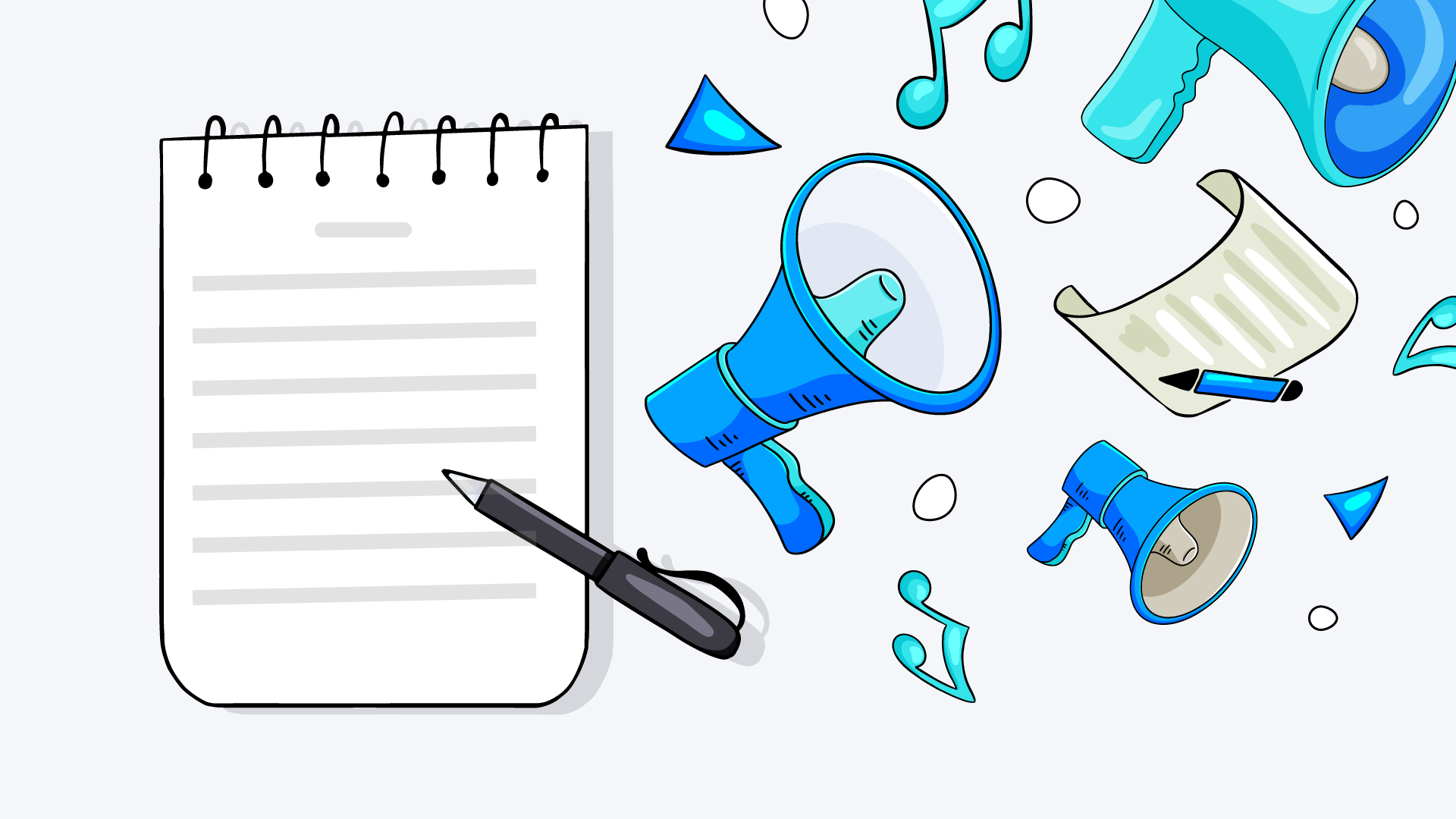
Table of Contents
Don't fall into the copy-paste guest email trap
ChatGPT and Claude are the two LLMs (Large Language Models) many people turn to for help with writing, and they can each turn out a pretty good letter, it's true. However, their output can only be as good as your instructions, and to tell you the truth, most of us can soon spot an AI-written email, especially if you just copy/paste and send.
Please, don't do that.
Podcast hosts are busy people and will discard pitches that are too formulaic, even if you've added personal details, mentioned their brand and so on.
Let's look at an example from each LLM to see what happens when you give them a simple writing prompt.
The AI test
The prompt: "Write a podcast outreach email from the founder of X to the host of podcast Y."
AI responses:
ChatGPT
Dear [Podcast Host's Name],
I hope this message finds you well. My name is [Your Name], and I'm reaching out on behalf of [Founder's Name], the visionary behind [X]. We've been avid listeners of [Podcast Y] and have been impressed by the insightful conversations you curate.
At [X], we're passionate about [briefly mention what X does or stands for]. We believe our journey and insights could resonate deeply with your audience, especially given [mention a recent episode or topic discussed on your podcast that aligns with X's mission or values].
[Founder's Name] has a unique perspective on [mention one or two key topics or industry trends], and we believe their experience could provide valuable insights for your listeners.
We would be honored to explore the possibility of [Founder's Name] being a guest on [Podcast Y]. I've included some suggested topics below that [Founder's Name] could discuss:
[Topic 1]
[Topic 2]
[Topic 3]
Please let us know if you're interested in having [Founder's Name] on the show. We're flexible with scheduling and would be happy to accommodate any requirements you have.
Looking forward to your response and the possibility of collaborating.
Best regards,
I used that prompt in several Chats to test the output. Their wording was slightly different but the overall template-formula was similar.
For example, here's the opening paragraph of another version:
Claude Sonnet
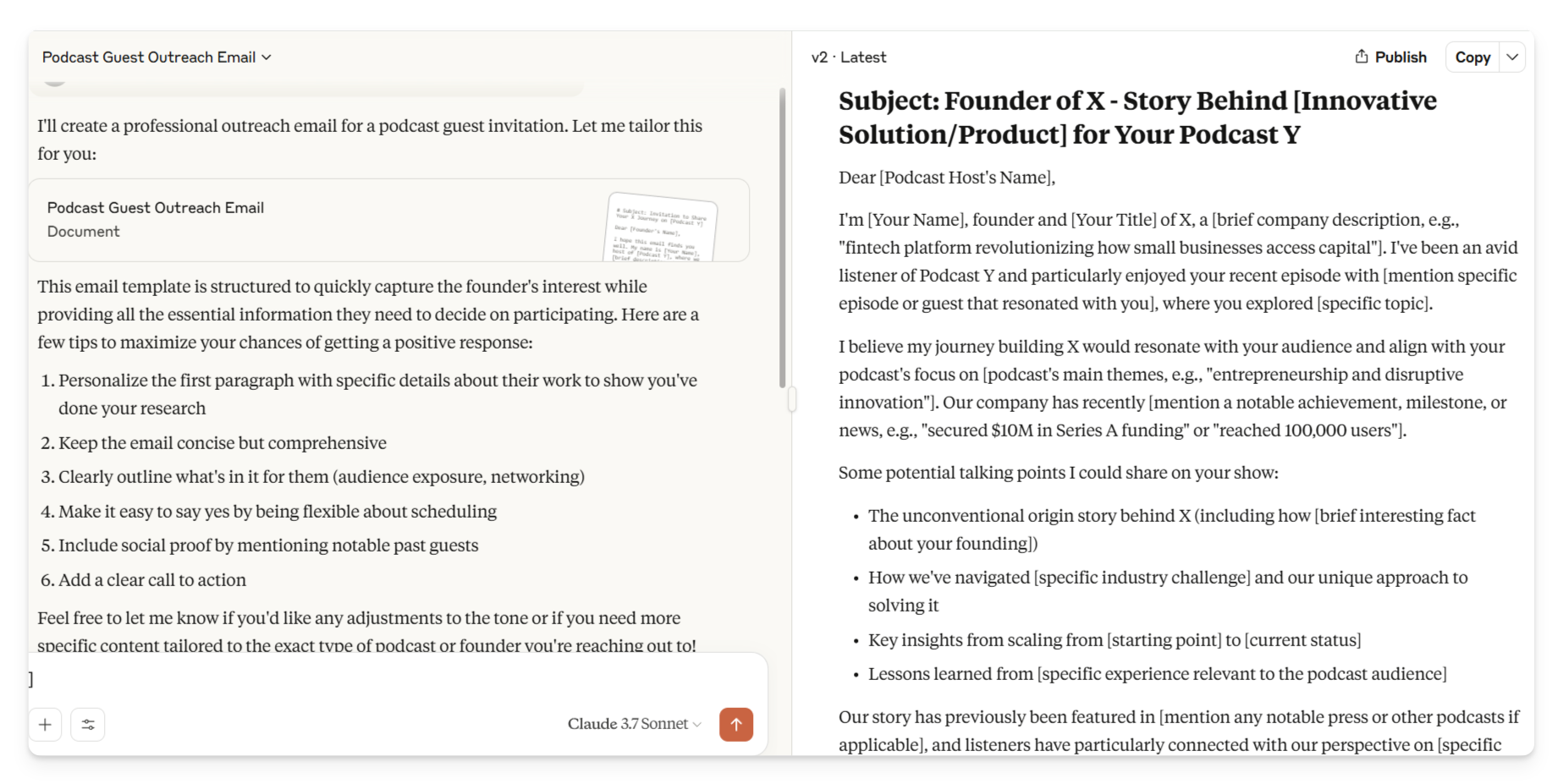
Dear [Podcast Host's Name],
I'm [Your Name], founder and [Your Title] of X, a [brief company description, e.g., "fintech platform revolutionizing how small businesses access capital"]. I've been an avid listener of Podcast Y and particularly enjoyed your recent episode with [mention specific episode or guest that resonated with you], where you explored [specific topic].
I believe my journey building X would resonate with your audience and align with your podcast's focus on [podcast's main themes, e.g., "entrepreneurship and disruptive innovation"]. Our company has recently [mention a notable achievement, milestone, or news, e.g., "secured $10M in Series A funding" or "reached 100,000 users"].
Some potential talking points I could share on your show:
- The unconventional origin story behind X (including how [brief interesting fact about your founding])
- How we've navigated [specific industry challenge] and our unique approach to solving it
- Key insights from scaling from [starting point] to [current status]
- Lessons learned from [specific experience relevant to the podcast audience]
Our story has previously been featured in [mention any notable press or other podcasts if applicable], and listeners have particularly connected with our perspective on [specific topic/approach].
I'm flexible with scheduling and available for recording over the next few weeks. I'd be happy to work around your production timeline.
Would you be interested in having me as a guest on Podcast Y? I'd be delighted to provide any additional information you might need to determine if this would be valuable for your audience.
Thank you for your consideration.
What is wrong with these podcast guest emails?
On the surface, each of these seems like a well-constructed interview request email.
But here's what they lack:
Personality—they follow a generic podcast pitch template with no room to demonstrate your flair.
Sincerity or humanity—they're full of buzzwords and marketing-speak, but it doesn't feel like a real person wrote these emails...
An attention-grabbing hook and subject line—there's nothing arresting about "Collaboration Opportunity: Podcast interview with X". Unless you're a famous recluse that hosts would give anything to interview, boring subject lines and generic opening sentences like these won't cut it.
Remember this email is possibly the first time the host has heard of you or your client (if you're an agency) so you want their response to be "ooh, yes please!" not yawn and delete.
How to use AI to writw a podcast guest pitch (the smart way)
AI can:
- give you ideas for a unique angle to pitch
- draft a pitch for you to edit and finalize
AI can't:
- replace actual expertise
- project your personality very well or do subtle humor
- build relationships
The approach I'm about to lay out works well when you (or your client) want to be a podcast guest because of your expert knowledge and unique insights.
Here goes!
#1. Get ideas for a unique angle to pitch
Find the podcast on Spotify or Rephonic
- Search previous episodes for a keyword related to your area of expertise
- Select five episode titles that are relevant
Let's imagine we're an agency setting up an interview between Paul Brunson and podcast host Chris Williamson on Modern Wisdom.
We'll include relevant information we have about Paul and the 5 episode titles we found.
The unique angle prompt:
#920 - John Delony - Why Do We Date People That Need Fixing?
#909 - Charles Duhigg - The Secret Habits Of Supercommunicators
#908 - Dr Shannon Curry - What Traits Should You Look For In A Partner?
#893 - Jillian Turecki - 9 Harsh Truths About How Relationships Work
#825 - Macken Murphy - The New Science Of Why Men & Women Cheat
We could also use the podcast description (copied from Rephonic or Spotify) instead of, or as well as, asking Chat to scan the web for information.
That prompt produces something like this from GPT-4.5:
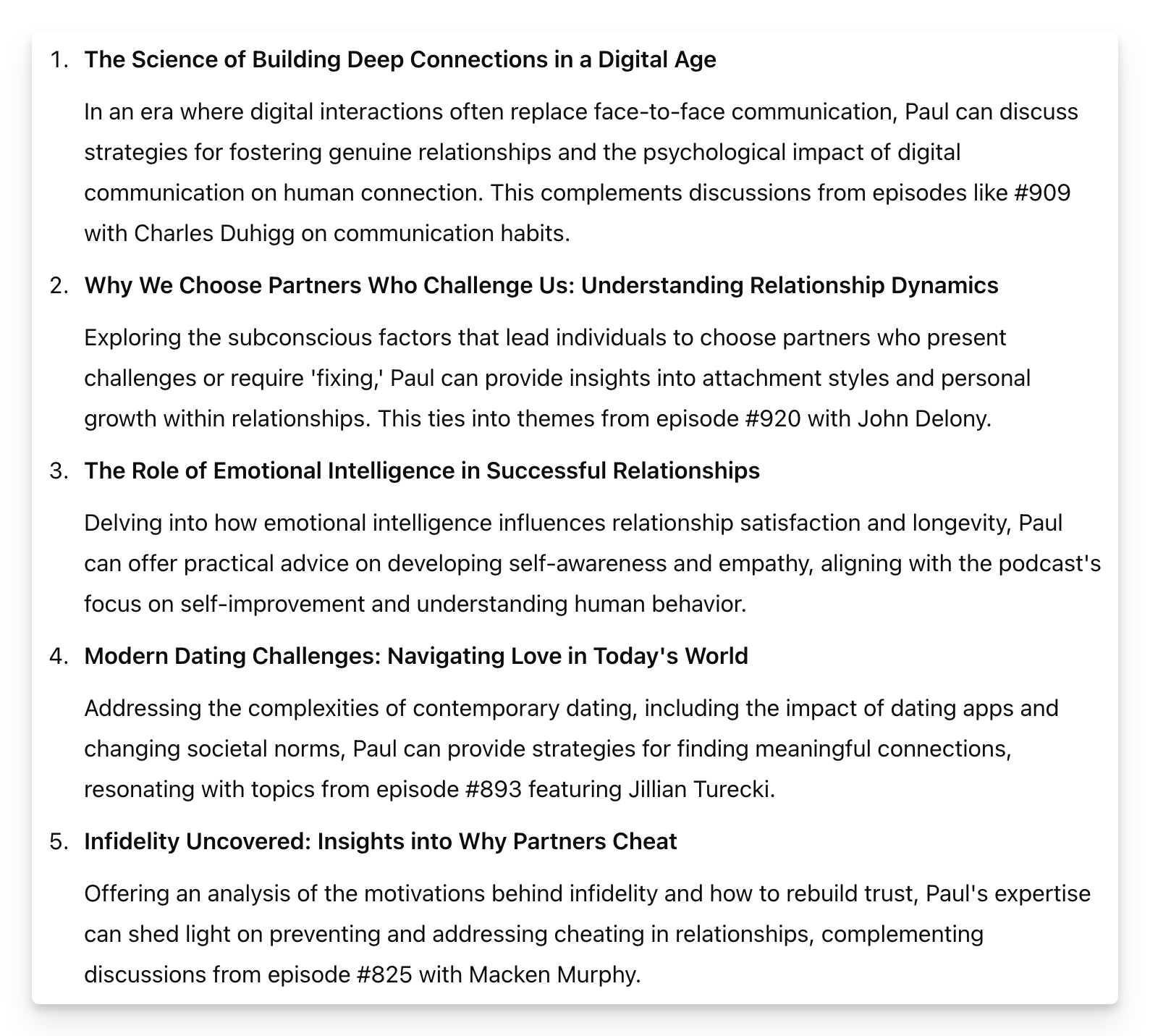
#2. Listen to the episode or read a transcript
This is all about choosing the angle that best suits you. You can do this by considering your own expertise and by listening to some of those related episodes to see if there are gaps you can fill in those conversations.
You might have an alternative perspective or unique insights that haven't come up so far. For examples, see my interview with Talya Heller on How to Attract B2B Clients Through Podcast Guesting, where she mentions the different angles she discusses depending on the podcast's audience and focus.
Decide which of these episodes would most fit your expertise or message, then dive into it to find parts that resonate for you. Take a little time to think about why they hit home. (You'll need this when you edit.)
This step won't take much extra time if you listen while commuting or exercising. Rephonic provides transcripts (here's the one from Charles Duhigg's episode) for most podcast episodes, which is handy if you'd rather read, or if you want to quote a passage.
#3. Get AI to write a first draft for you to edit and complete
Feed your unique angle into your LLM and ask it to draft a podcast guest email using the pitch below as inspiration.
"The Science of Building Deep Connections in a Digital Age
In an era where digital interactions often replace face-to-face communication, Paul can discuss strategies for fostering genuine relationships and the psychological impact of digital communication on human connection. This complements discussions from episodes like #909 with Charles Duhigg on communication habits."
Use the pitch below as inspiration:
"Hey Dan,
Really enjoyed your chat with Joe Bloggs, especially the part about the mental load founders carry. It hit home.
If you’re open to guests, I’d love to join you to dig into how entrepreneurs can grow their business without burning out. I’ve spent the past decade coaching founders on building companies and staying sane — stuff like spotting burnout early, setting boundaries that actually stick, and creating sustainable growth habits.
Happy to share the episode with my audience too — they’d definitely tune in.
No stress if it’s not a fit, just wanted to put it out there. Keep doing your thing!
Cheers, Matt"
And here's what we get from ChatGPT:
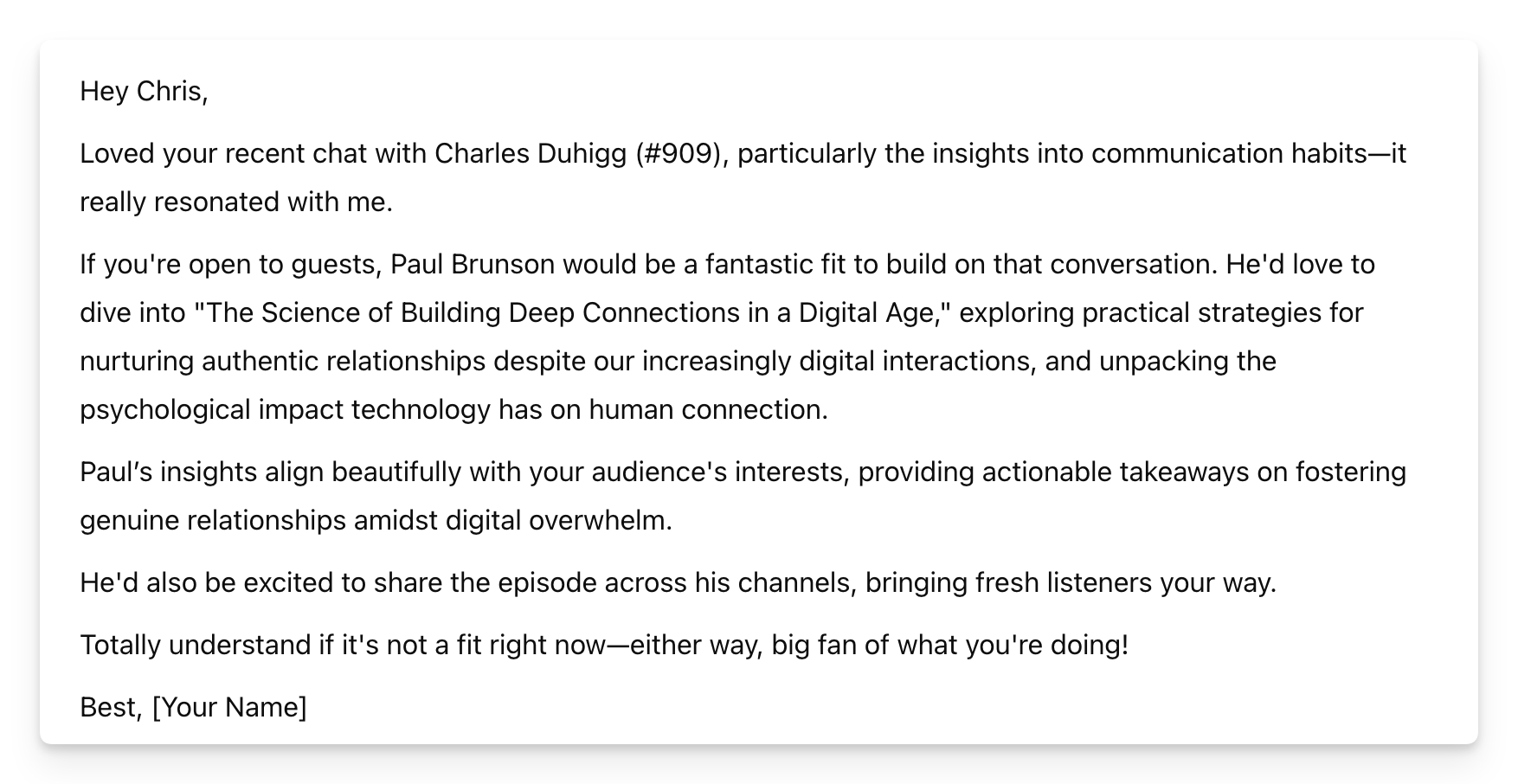
#4. Edit that first draft
The above is a much better email pitch but it needs some tweaking. For example we might:
- Remove the episode number
- Remove the quotation marks and make it flow in the sentence more
- Add a bit of humor
- Add an authentic personal comment an AI couldn't write, e.g. don't just say the episode resonated, mention what you reacted to and why.
- Change the tone. This is a good free tool - but I'd still recommend editing afterward.
#5. Re-read, then send your pitch
Now you've edited that first draft it should be nothing like an email template. That is far more likely to capture the attention of a podcast host than an unchanged copy/paste.
A couple of hints:
- Chat makes a terrific thesaurus. You can ask it to simplify convoluted sentences or suggest alternative words and phrases, and keep asking until it comes up with exactly the right thing.
- Use Rephonic's audience page to gather insights into the likely demographics and interest of your target podcast's audience.
You might notice that I've used both in my final podcast pitch.
The final draft - including unique angles and personalized comments
Loved your recent chat with Charles Duhigg, particularly when you mentioned those three communication buckets and your argument with your wife. My partner and I often have those sorts of conversations where we both end up feeling aggrieved, and now I understand why that happens. So, thanks for that.
If you're open to guests, Paul Brunson would be a fantastic fit to build on that conversation. He'd love to explore more about building deep connections in the digital age by sharing practical strategies for nurturing authentic relationships, when so much of our communication happens online.
I think Paul's insights will align beautifully with your audience's interests in self-improvement and mental health.
He'd also be excited to share the episode across his channels, bringing fresh listeners your way.
Totally understand if it's not a fit right now—either way, big fan of what you're doing.
Best, Lyn
#6. Send a follow up email if necessary
Allow about a week, then politely follow up your podcast pitch with something like:
Then include your original email.
Final thoughts
Asking a Large Language Model AI to write a pitch will inevitably get you something that could have come straight from any old email template. No matter how cleverly you word the prompt, an AI response will always feel generic and slightly false at first.
Instead, get it to do the research for you. (And your final draft will be even better if you include Rephonic's insights too.)
It takes very little time to do and gives you enough insight to craft a prompt that'll generate a well-crafted first draft. Then it's easy to tweak the wording and add a truly personal comment to show you really mean what you say.
All this gets faster and easier the more you do it—practice really does help.
Want to find more insights for your podcast pitches?
Rephonic is the most complete podcast database for PR teams, marketers, and founders looking to book high-impact guest appearances and ad spots. Access listener numbers, contact info, audience demographics and more for over three million podcasts.
Explore hidden podcast data with our free trial.
Article credits

Written by Lyn McNamee, podcast-PR writer with four years of experience transforming podcast insights into practical, results-focused playbooks.

Edited by Becca Butcher, marketing specialist who frequently analyzes Rephonic’s data across 3 million podcasts.
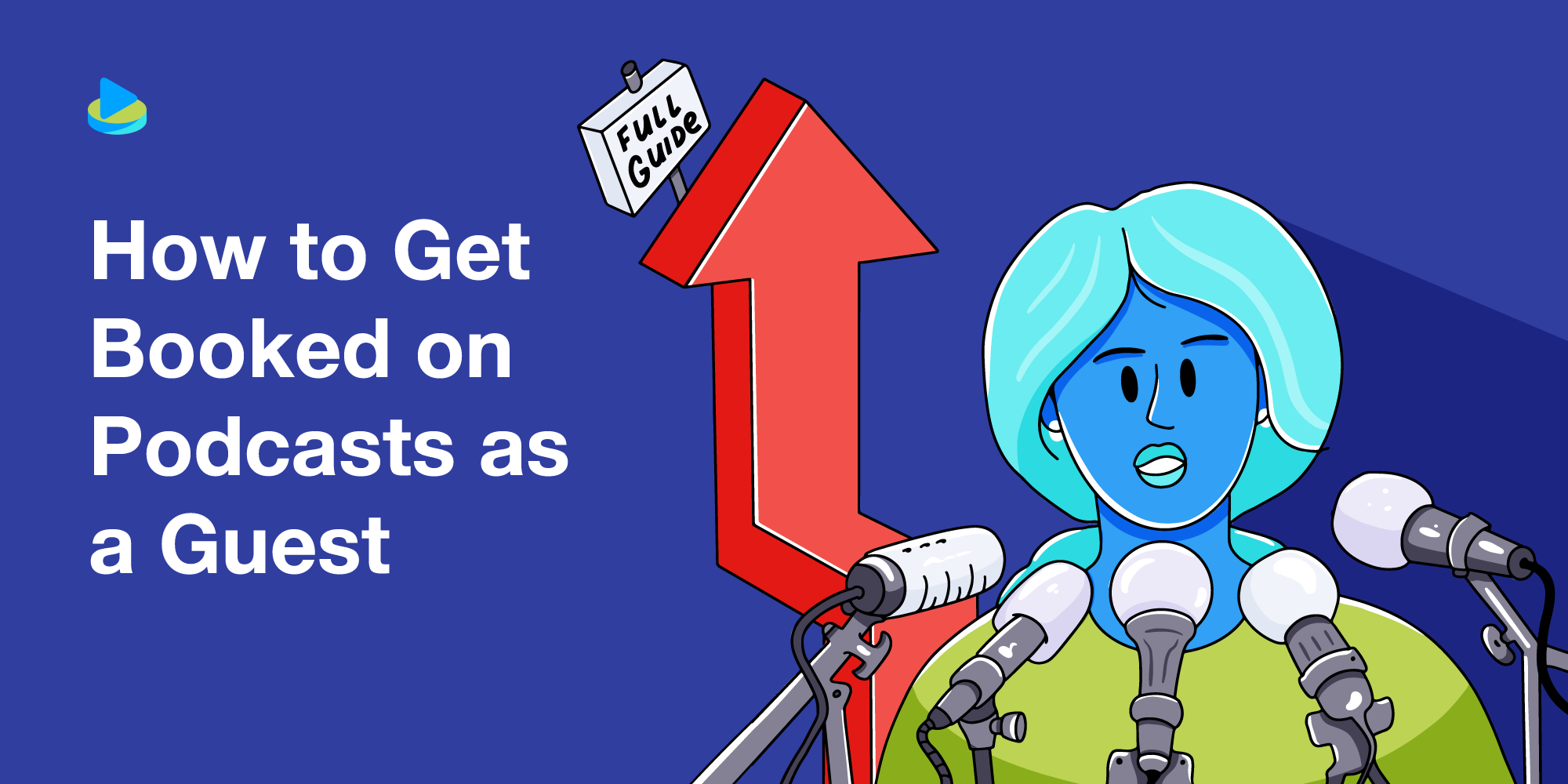
How to Get Booked on Podcasts: Full Podcast Guesting Guide
This in-depth guide explains what you can expect to gain from podcast interviews, how to find the right shows, pitch effectively, prep for the interview, and follow up afterward.
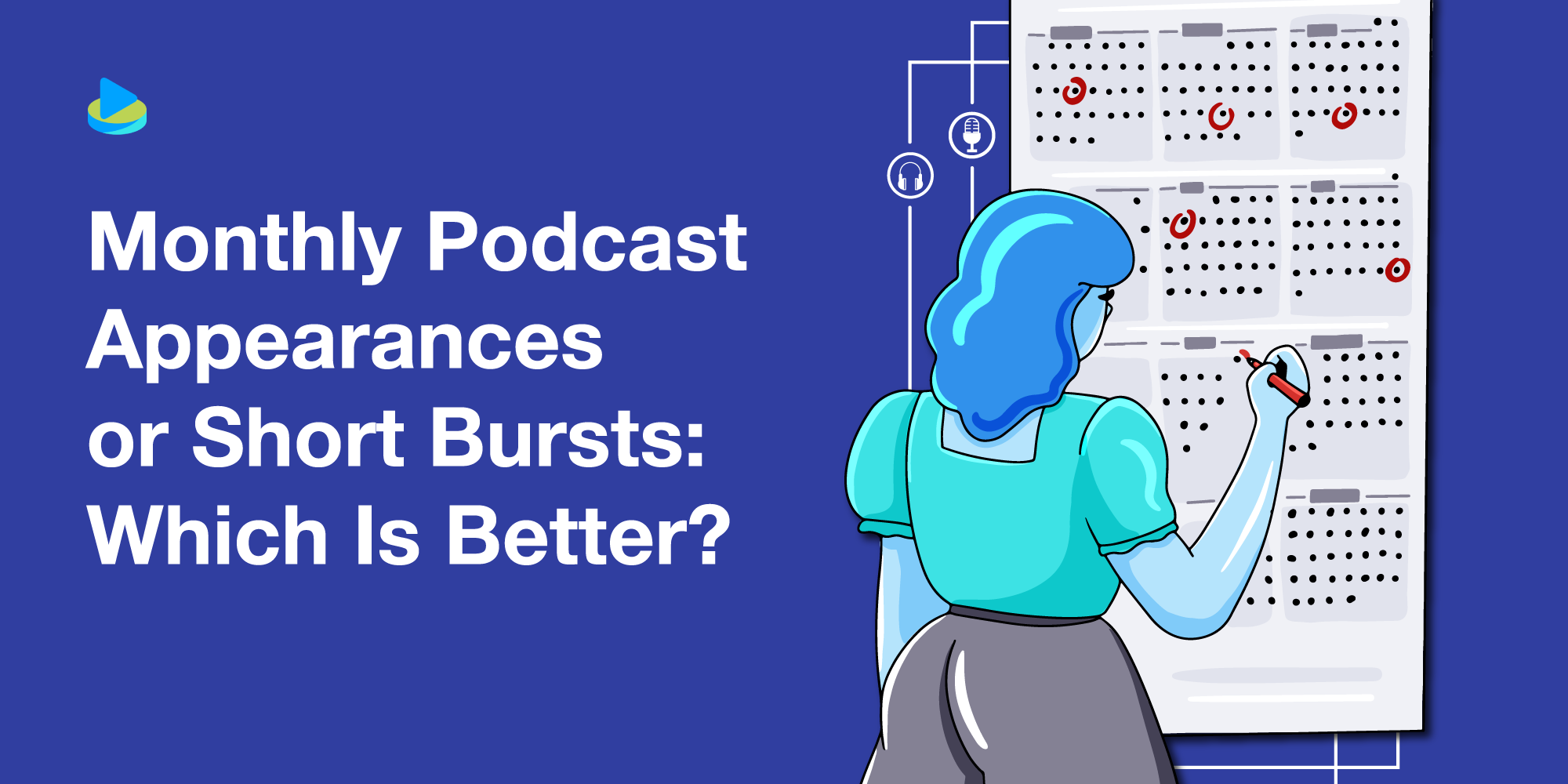
Monthly Podcast Appearances or Intense Bursts: Which Is Better?
Podcast sprints or a spaced approach—which guesting strategy works best? Or should you try a hybrid? We break down the pros and cons of all three.

